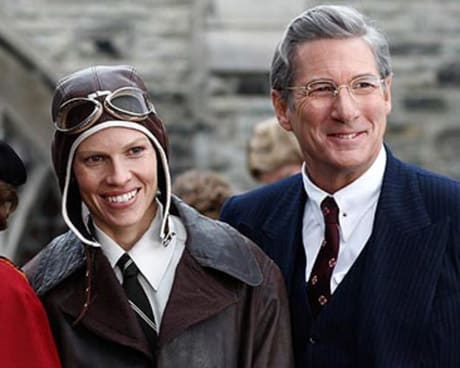Amelia, Mira Nair's biopic of a certain first-female-to-fly-the-Atlantic you may have heard about, accomplished the amazing task of making me wonder if Amelia Earhart was really interesting enough to build a movie around. Could that be possible? Sure, the film covers all the key moments: it begins shortly before her first flight across the Atlantic ― the plane ghost flown, one could say, by two male "assistants" ― then covers her second Atlantic flight before finishing with her obviously ill-fated around-the-world attempt.
Between these defining moments, however, momentum grinds to a halt. The film spends the most time on Earhart's (Hilary Swank) unsteady relationship with publisher and de facto sponsor George Putnam (Richard Gere), with a detour to her affair with Gene "father of Gore" Vidal (Ewan McGregor), but neither of these relationships generate much chemistry, and the Vidal arc in particular feels jarringly abbreviated. There's little explanation what these people saw in each other, other than the Wikipedia article about Amelia Earhart dictated their actions.
Amelia is the kind of biopic where nearly all the exposition is delivered through unconvincing newsreel footage and ― groan ― flashing newspaper headlines. The dialogue is full of such pearls as "Earhart couldn't lift a pigeon off the ground!" and "This will be my last flight" ― annoying little nudges in the ribs for a knowing audience. And, as if afraid that some subtlety might seep through the cracks of this fortress of obviousness, Nail soaks every scene in a relentless musical score by Gabriel Yared, which threatens to come into the audience and jerk the tears right out of their eyes.
Sure, this is a handsome production, expensive-looking and glossy, with a colour scheme reminiscent of an early Technicolor musical, but maybe it's a little too handsome. This is such an antiseptic version of the '30s that it looks like someone personally polished every fedora.
Hilary Swank's performance is difficult to evaluate. With a butch haircut and huge row of upper teeth on almost perpetual display she certainly looks the part but always seems to be imitating rather than inhabiting the role. It's not all her fault; it would be hard to imagine a less interesting version of the character than the one writers Ronald Bass and Anna Hamilton Phelan have come up with.
I wish I could have seen her in a less artificial film. Here, she's a bit like the best dummy in a wax museum.
(Fox)Between these defining moments, however, momentum grinds to a halt. The film spends the most time on Earhart's (Hilary Swank) unsteady relationship with publisher and de facto sponsor George Putnam (Richard Gere), with a detour to her affair with Gene "father of Gore" Vidal (Ewan McGregor), but neither of these relationships generate much chemistry, and the Vidal arc in particular feels jarringly abbreviated. There's little explanation what these people saw in each other, other than the Wikipedia article about Amelia Earhart dictated their actions.
Amelia is the kind of biopic where nearly all the exposition is delivered through unconvincing newsreel footage and ― groan ― flashing newspaper headlines. The dialogue is full of such pearls as "Earhart couldn't lift a pigeon off the ground!" and "This will be my last flight" ― annoying little nudges in the ribs for a knowing audience. And, as if afraid that some subtlety might seep through the cracks of this fortress of obviousness, Nail soaks every scene in a relentless musical score by Gabriel Yared, which threatens to come into the audience and jerk the tears right out of their eyes.
Sure, this is a handsome production, expensive-looking and glossy, with a colour scheme reminiscent of an early Technicolor musical, but maybe it's a little too handsome. This is such an antiseptic version of the '30s that it looks like someone personally polished every fedora.
Hilary Swank's performance is difficult to evaluate. With a butch haircut and huge row of upper teeth on almost perpetual display she certainly looks the part but always seems to be imitating rather than inhabiting the role. It's not all her fault; it would be hard to imagine a less interesting version of the character than the one writers Ronald Bass and Anna Hamilton Phelan have come up with.
I wish I could have seen her in a less artificial film. Here, she's a bit like the best dummy in a wax museum.
